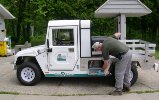
Wisconsin State Parks Make the E-Vehicle Switch
A fleet of 15 electric vehicles is helping the Department of Natural Resources save money as it maintains state park facilities.
Wisconsin’s state park system had two goals when replacing trucks used for park maintenance and cleaning: They wanted to be good environmental stewards and they wanted to save money. They did both by purchasing a fleet of 15 E-Ride electric vehicles manufactured by E-Ride Industries in Princeton, Minn.
The 100-percent electric utility vehicles feature zero emissions, according to the manufacturer, and they cost from 30 to 50 percent less to buy than a pick-up truck. Made in America, the vehicles operate at up to 25 mph and can travel 40 to 50 miles per charge. The Wisconsin vehicles (EXV2) are “workhorse” models and feature a totally enclosed cab with a stake side truck bed. Some units were customized with full-length aluminum enclosures to protect the payload.
According to Gene Tiser, acting Peninsula State Park superintendent, the vehicles are being put to the test. The park has 468 campsites in five campgrounds, three group camp sites and five picnic areas. The E-Ride vehicles haul supplies and cleaning equipment to different flush toilet buildings and 17 vault toilets. It’s a full day’s work for both vehicles. Property staff members re-charge the batteries nightly.
“These vehicles are quiet, have plenty of power, and reduce the property’s carbon footprint. They’re roomy enough to hold supplies for a full day’s work, are easy for my workers to operate and are safe to drive” said Tiser.
According to Landon Williams, Systems manager for the Wisconsin Department of Natural Resources, “We are continually evaluating our programs and looking for new ways to streamline operations and realize savings. These E-Ride vehicles are one way we can accomplish those goals. Also, he added “Visitors to Wisconsin State Parks are concerned about the environment, especially when it comes to conserving and protecting Wisconsin’s natural resources. When they hear that we are replacing vehicles with internal combustion engines in favor of vehicles with zero emissions, their reaction has been overwhelmingly positive.”